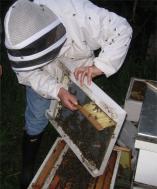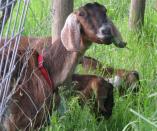The last of the Feed Your Mind lectures I was able to attend at Kings College was Creating Meat with Stem Cell Technology, a presentation by Mark Post of Maastricht University. He was behind the “stem burgers” launched with great media attention last summer. No risk they will be hitting store shelves soon as each burger, he said, cost €250,000 to produce.
It was a fairly technical talk: Post explained the constraints of working with stem cells to create food. For example, the most popular cell culture medium in labs nowadays is derived from mouse tumours, and this would not sound, well, appetizing for food production. Instead he’s going to try using the protein fraction left over from algae-based biofuel production. Ultimately he’s aiming for a source of stem cells that doesn’t require bovine input – since he is trying to make cattle extinct, and he’s keen on sustainability. He seemed genuinely hurt that his work has been dubbed “frankenfood” and “lab burger”.
Because his aim in doing this work, he felt, was in the greater good. He wanted to raise awareness and offer solutions to the problems of food security in a time of mushrooming population growth. Humans, he said, have a taste for meat; in order to provide it, we must rethink our unsustainable methods of growing it, so that we can devote more of our dwindling arable land to growing fruits and vegetables.
There is so much wrong with his thinking I hardly know where to start. Firstly and most importantly (one might think), the nutritional value of cells grown in a medium consisting of amino acids, vitamins and sugar will never be comparable to that of food from animals raised on plants, water and sunshine. But his talk never touched on nutritional concerns.
Have humans learned nothing from our extensive attempts to mimic nature? Think margarine. Think beta-carotene supplements. Think high fructose corn syrup. Still, we’re facing a generation of humans who have lost their ability to cook, to identify foods, to taste the difference between real and artificial food flavours, or to take responsibility for their food choices. He cited a survey of Dutch people, 75% of whom had said they might be willing to give stem burgers a go. To those people, artificially grown meat might be an acceptable thing to put in their mouths, but it won’t properly nourish their brains and bodies: we will have to wait to see what the deficiencies do to our species.
Secondly, while current methods of intensive livestock production are certainly wrong and unsustainable, using arable land for industrial fruit and vegetable production has been shown repeatedly to be the least sustainable method of feeding a growing world. Post did not appear to be aware of the damage wrought to topsoil, ecosystems or microbial life by monocropping and large-scale agriculture. Nor did he give any sense he knew of better alternatives like permaculture or grasslands management.
But it is not in Post’s interests to know these things. A vascular biologist, his job is obtaining grants to do lab research. And he has been successful in doing this, with two years’ worth of funds in hand to try to eliminate animal-based cells from “meat” production; to improve the taste, smell and texture of stem cell “meat”; to bring down production costs; and to work on the regulatory path needed to approve this as a novel food.
The best and final question of the session came from a chef in the audience, who wondered if this substance from stem cells was going to be to meat as infant formula is to breast milk. Post did not seem to understand the question and with spectacular hubris said in fact he hoped they could make this product better than meat by isolating and removing the harmful qualities of it which cause, for example, colon cancer — once they figure out what those qualities are.










